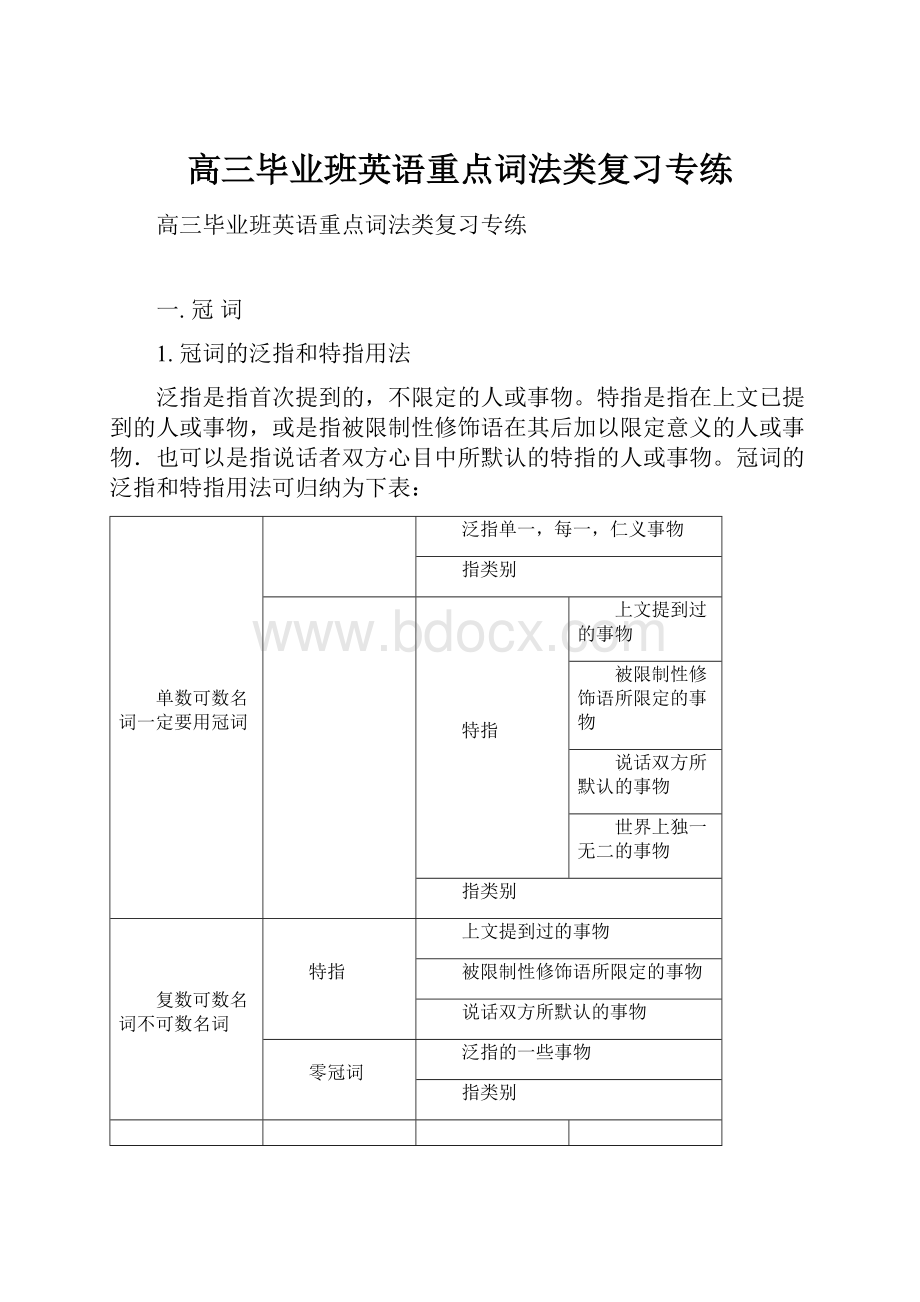高三毕业班英语重点词法类复习专练.docx
《高三毕业班英语重点词法类复习专练.docx》由会员分享,可在线阅读,更多相关《高三毕业班英语重点词法类复习专练.docx(276页珍藏版)》请在冰豆网上搜索。

高三毕业班英语重点词法类复习专练
高三毕业班英语重点词法类复习专练
一.冠词
1.冠词的泛指和特指用法
泛指是指首次提到的,不限定的人或事物。
特指是指在上文已提到的人或事物,或是指被限制性修饰语在其后加以限定意义的人或事物.也可以是指说话者双方心目中所默认的特指的人或事物。
冠词的泛指和特指用法可归纳为下表:
单数可数名词一定要用冠词
泛指单一,每一,仁义事物
指类别
特指
上文提到过的事物
被限制性修饰语所限定的事物
说话双方所默认的事物
世界上独一无二的事物
指类别
复数可数名词不可数名词
特指
上文提到过的事物
被限制性修饰语所限定的事物
说话双方所默认的事物
零冠词
泛指的一些事物
指类别
不定冠词修饰可数名词.其意思为“一个”;定冠词既可修饰可数名词,也可修饰不可数名词,往往表特指.其意思相当于“这个”,单数可数名词只要不用在抽象化的语境中,一定要加冠词(或者加不定冠词,或者加定冠词)。
这时不妨可用“一个”或“这个(种)”来检验。
(1)---Haveyouseen_____pen?
Ileftitherethismorning.
---Isit_____blackone?
IthinkIsawitsomewhere.
A.a;theB.the;theC.the;aD.a;a
(2)Mostanimalhavelittleconnectionwith_____animalsof_____differentkindunlesstheykillthemforfood.
A.the;aB./;aC.the;theD./;/
2.不定冠词a(n)的几种特殊用法
(1)不定冠词a(n)用于有或没有形容词修饰的抽象名词前。
ManypeopleagreedthataknowledgeofEnglishisamustininternationaltradetoday.
许多人都持相同的看法,在当前国际贸易交往中,英语知识是必备的知识。
(2)不定冠词s(n)用于有形容词修饰的一日二餐前。
BeforeIgotoworkeverymorning,I’vealightbreakfast.
我每天早晨上班前.吃点简单的早餐。
(3)不定冠词a(n)用于有形容词修饰的季节、日期前。
ThetrafficaccidenthappenedonaSundaytowardstheendofJuly.
车祸是7月底的一个星期天发生的。
(4)不定冠词a(n)用于序数词前,表示一次,又一。
Howimportantitistolearnasecondlanguage!
再学一门语言是多么重要啊!
(5)不定冠词a(n)表示“per”的意思。
Hisincomeisonethousandyuanamonth.
他的月收入是1000元。
(6)不定冠词a(n)用于有good/greatmany修饰的名词复数前。
I’vevisitedtheGreatWallagoodmanytimes.
我参观过长城好多次。
’
(7)不定冠词a(n)用于形式为复数,但意义仍为单数的名词前。
Athousandmilesisagooddistance.
一千英里是相当远的距离。
(8)不定冠词a(n)用于一些原来是动词的名词前。
Let’shaveawalkaroundtheplaygroundaftersupper.
晚饭后,让我们围着操场散步吧!
(9)有一些抽象名词:
advice(忠告),behavior(行为),fortune(运气),fun(娱乐),information(情报),progress(进步),damage(损害),harm(伤害)等,即使被形容词修饰,也不加不定冠词。
KarlMarxgaveussomeadviceonhowtolearnforeignlanguagewell.
卡尔·马克思就怎样学好外语,提出了许多建议。
(10)用在某些固定词组中。
Afew,alittle,alotof,abit,acoupleof,allofasudden(突然),asamatteroffact(实际上),inahurry(匆忙的),inaword(简言之),haveagoodtime(玩得愉快),dosb.afavour(帮忙),payavisitto(访问),asarule(惯例),asawhole(总之),inadayortwo(一两天),inaway(在某种程度上),ofasize(大小相同),haveawordwithsb.(与…交谈),makealiving(谋生),takeapridein(自豪),takeawalk(break,bath,seat)(散步(休息、洗澡、就座)),agreatdealof(大量),beapity(遗憾),haveacold(headache,fever)(感冒(头痛、发烧)),manya(许多),catchacold(感冒).
3.用冠词与不用冠词的差异
在某些习惯用语中,用还是不用冠词,意义不同,有时甚至差别很大,使用时要特别注意。
attable
进餐
atthetable
在桌子旁
inhospital
住院
inthehospital
在医院里
bysea
乘船(由海路)
bythesea
在海边
gotosea
当水手
gotothesea
去海边
infuture
从今以后,将来
inthefuture
未来
onearth
究竟
ontheearth
在地球上,在世上
gotoschool(church…)
上学(做礼拜…)
gototheschool(church…)
到学校(教堂)去
infrontof
在…(外部的)前面
inthefrontof
在…(内部的)前面
onhorseback
骑着马
onthehorseback
在马背上
takeplace
发生
taketheplaceof
代替
twoofus
我们当中的两人
thetwoofus
我们两人(共计两人)
outofquestion
毫无疑问,一定
outofthequestion
不可能
onthewhole=ingeneral
大体上,一般地
asawhole=altogether
全部地,整体
Amostimportantmeeting
一个重要的会议
themostimportantmeeting
最重要的会议
Athirdtime
又一次
thethirdtime
第三次
atadistance
稍远一些
inthedistance
在远处
Anumberof
许多
thenumberof
…的数目
foramoment
一会儿
forthemoment
目前,暂时
beinchargeof
负责…
beinthechargeof
由…负责,在…掌管之下
byday
在白天
bytheday
按日计算
inpossessionof
拥有
inthepossessionof
为…所有
insightof
能看见
inthesightof
据…的见解
inplaceof
代替
intheplaceof
在…的地方
beofage
成年
beofanage
同龄
takeadvice
征求意见
taketheadvice
听从劝告
Heisstillinoffice.
他仍在执政
Heisstillintheoffice.
他仍在办公室里
1.Papermoneywasin_____useinChinawhenMarcoPolovisitedthecountryin_____thirteenthcentury.
A.the;/B.the;theC./;theD./;/
2.Itisnotrarein_____thatpeoplein_____fiftiesaregoingtouniversityforfurthereducation.
A.90s;theirB.the90s;/C.90s;.D.the90s;their
3.Summerin_____southofFrancearefor_____mostpartdryandsunny.
A./;aB.the;/C./;/D.the;the
4.Mostanimalshavelittleconnectionwith_____animalsof_____differentkindunlesstheyhunt
themforfood.
A.the;aB./;aC.the;theD./;he
5.Mr.Smith,there'samanat_____frontdoorwhosayshehas_____newsforyouofgreat
importance.
A.file:
/B.the;theC./;/D./;the
6.Thewarmthof_____sweaterwillofcoursebedeterminedbytheshortof_____woodused.
A.the;fileB.die;/C./;/D./;/
7.Abullethitthesoldierandhewaswoundedin_____leg.
A.aBoneC.theD.his
8.Idon'tliketalkingon_____telephone.Ipreferwriting_____letters.
A.a;theB.the;/C.the;theD.a;/
9.Jumpingoutof_____airplaneattenthousandthatisquite_____.excitingexperience.
A./;theB./;anC.an;anD.the;the
10.Onewaytounderstandthousandsofnewwordsistogaingoodknowledgeofbasicword
formation.
A./B.theC.aD.one
11.Thecakesaredelicious.He'dliketohave_____thirdonebecause_____secondoneisrathertoo
small
A.a;aB.the;theC.a;theD.the;a
12.There's_____dictionaryon_____deskbyyourside.
A,a;theB.a;aC.the;aD.the;the
13.---Whereismyblueshirt?
---It'sinthewashingmachine.Youhavetowear_____differentone.
A.anyB.theC.aD.other
14.Thesignreads"Incaseof_____fire,breaktheglassandpush_____redbutton.
A./;aB./;theC.the;theD.a;a
15.Iearn10dollars_____houras_____supermarketcashieronSaturdays.
A.a;anB.the;aC.an;aD.an;the
2006全国各省市高考试卷中的冠词试题:
1.(全国卷I)30.—Hello,couldIspeaktoMr.Smith?
—Sorry,wrongnumber.Thereisn't______Mr.Smithhere.
A.不填B.aC.theD.one
2.(全国卷2)19.Iknowyoudon’tlike_______musicverymuch.Butwhatdoyouthinkof_______musicinthefilmwesawyesterday?
A./;/B.the;theC.the;/D./;the
3.(北京卷)26.---Iknockedovermycoffeecup.Itwentrightover______keyboard.
---Youshouldn’tputdrinksnear________computer.
A.the;不填B.the;aC.a;不填D.a;a
4.(重庆卷)25.Everywheremanhascutdown _______forestsinordertogrowcrops,ortouse______woodasfuelorasbuildingmaterial.
A.the;theB.the;/ C./;theD./;/
5.(辽宁卷)21.Ofallreasonsformydecisiontobecomeauniversityprofessor,myfather’sadvicewasmostimportantone.
A.the;aB.不填;aC.不填;theD.the;the
6.(陕西卷)15.Accordingto_________WorldHealthOrganization,healthcareplansareneededinallbigcitiestoprevent_________spreadofAIDS.
A.the;不填 B.the;theC.a;aD.不填;the
7.(湖南卷)22.In___________reviewof44studies,Americanresearchersfoundthatmenandwomenwhoatesixkeyfoodsdailycuttheriskof___________heartdiseaseby76%.
A.a;theB.the;aC.a;不填 D.不填;a
8.(浙江卷)3.Don’tworryifyoucan’tcometo_____party.---I’llsave_____cakeforyou.(+代词)
A.the;someB.a;muchC.the;anyD.a;little
9.(山东卷)21.Forhim____stageisjust___meansofmakingaliving.
A.a;aB.the;aC.the;theD.a;the
Keys:
1-5BDBCDBCAB
二.名词
一、考点聚焦
1.可数名词单、复数变化形式
(1)规则变化。
①单数名词词尾直接加-s。
如:
boy—boys,pen—pens。
②以s、x、ch、sh结尾的单词一般加-es。
如:
glass—glasses,box—boxes,watch—watches,brush—brushes。
特例:
stomach—stomaches。
③以“辅音字母+y”结尾的变“y”为“i”再加“-es”。
如:
baby—babies,lady—ladies,fly—flies。
④以“o”结尾的多数加-es。
如:
tomato—tomatoes,potato—potatoes,hero—heroes。
但以两个元音字母结尾的名词和部分外来词中以o结尾的词只加-s。
如:
radio—radios,zoo—zoos,photo—photos,piano—pianos,kilo—kilos,tobacco—tobaccos。
⑤以“f”或“fe”结尾的名词复数形式变“f”或“fe”为“v”,之后再加-es。
如:
wife—wives,life—lives,knife—knives,wolf—wolves,self—selves,leaf—leaves等。
特例:
handkerchief—handkerchiefs,roof—roofs,chief—chiefs,gulf—gulfs,belief—beliefs,cliff—cliffs。
⑥改变元音字母的。
如:
man—men,mouse—mice,foot—feet,
woman—women,tooth—teeth,goose—geese,ox—oxen。
特例:
child—children。
⑦复合名词的复数形式。
(A)在复合词中最后名词尾加-s。
如:
armchair—armchairs,bookcase—bookcases,bookstore—book-
stores。
(B)man和woman作定语修饰另一个名词时,前后两个名词都要变成复数。
如:
mandoctor—mendoctors,womandriver—womendri-
vers。
(C)与介词或副词一起构成的复合名词应在主体名词部分加-s。
如:
brother-in-law—brothers-in-law,passer-by—passers-by。
⑧有的名词有两种复数形式。
如:
zero—zeros、zeroes,deer—
deers、deer。
penny的两种复数形式含义有所不同。
如:
pence(便士的钱数),pennies(便士的枚数)。
(2)不规则变化。
①单、复数同形。
如:
means,aircraft,deer,fish,Chinese,
Japanese,sheep,works(工厂),cattle。
②合成名词的复数。
如:
boy-friend—boy-friends,go-between—go-betweens(中间人),grown-up—grown-ups。
③有些名词通常只用作复数。
如:
glasses眼镜,clothes衣服,goods
货物,trousers裤子,belongings所有物,wages工资,riches财富,surroundings环境,ashes灰尘,campasses圆规,cattle家畜,congratulations祝贺,havewordswithsb.同某人吵架,inhighspirits以很高热情地,giveone’sregardstosb.向某人问侯,inrags衣衫破烂,Itisgoodmannerstodosth.有礼貌做某事。
④集体名词的数。
有些集体名词通常只用作复数,如:
people,
cattle,police;有些名词只用作单数,如:
machinery,furniture,mankind,jewellery;有些名词既可用作单数又可用作复数,单数看做整体,复数看做集体的各个成员。
如:
Thecrewislarge.船员人数很多(指整体);Thecrewarealltired.船员们都累坏了(个体)。
2、不可数名词的数
(1)一般说来抽象名词为不可数名词,但当抽象名词表示具体的东西时,可用作可数名词且词义发生变化,主要类型如下:
①抽象名词表示具有某种特性、状态、感情情绪的人或事。
如:
抽象名词(不可数)具体化(个体名词,可数名词)
insurprise惊讶地asurprise一件令人惊讶的事
winsuccess获得成功asuccess一个(件)成功的人(事)
winhonor赢得荣誉anhonor一个(件)引以为荣的(事)
Failure(失败)isthemotherofsuccessafailure失败者
失败是成功之母。
byexperience靠经验anexperience一次经历
youth青春ayouth一个青年人
havepityonsb.怜悯某人apity可惜的事情
withpleasure乐意apleasure乐事
②抽象名词与a(an)连用,淡化了抽象概念,转化为似乎可以体验到的动作、行为或类别。
如:
AknowledgeofEnglishisamustininternationaltrade.
Wouldyouliketohaveawalk(swim,bath,talk)withme?
Itiswasteoftimereadingsuchanovel.
Shemadeanapologytohermotherforherwrongdoings.
(2)物质名词是不可数名词,但表示数量或种类之多时,可以用作可数名词。
如:
①物质名词有形或数的相应物体,有单、复数。
如:
somecoffee一些咖啡,acoffee一杯咖啡,threecoffees三杯咖啡,somedrink一些饮料,adrink一杯饮料,threedrinks三杯饮料,hishair他的头发,afewgreyhairs几根白发,glass玻璃,aglass一只玻璃杯